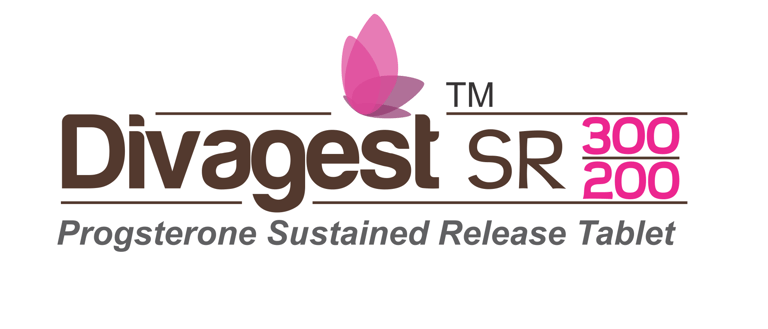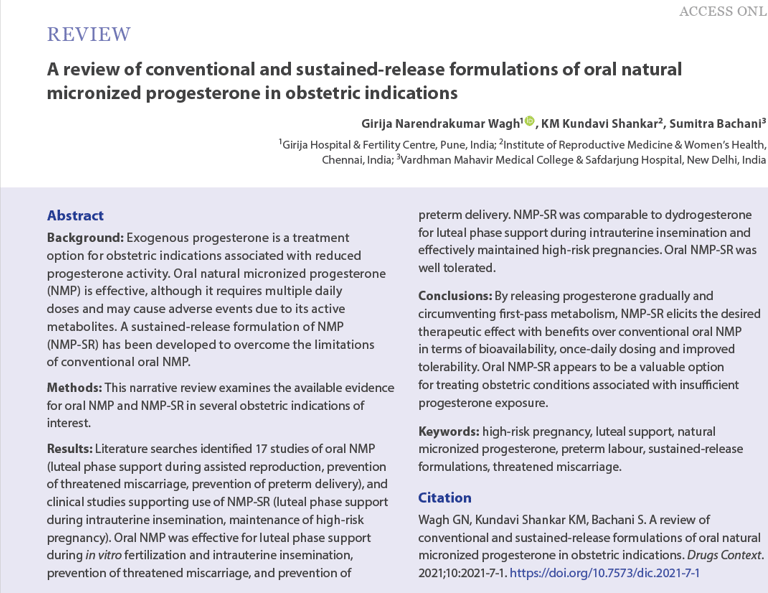

PREVENTING PRETERM BIRTH - ROLE OF PROGESTERONE
Watch eminent speaker.
Dr. Ranjana Khanna (ICOG Governing Council Member, Vice President FOGSI 2017)
delve into the role of progesterone for preventing preterm birth

Key Takeaways:
Which progesterone to choose will depend on clinical evidence in the Indian population, as differences appear in the guidelines based on literature:
Guidelines by NICE, FIGO & SMFM recommend the use of progestogens for women at high risk of preterm birth.
NICE, FIGO and SMFM endorse the use of vaginal progesterone for primary prevention of recurrent preterm birth.
Natural micronized progesterone is as effective as cerclage in preventing preterm labor in women with singleton pregnancy with short cervix.
Use of Natural micronized progesterone in clinical practice is preferred over cerclage as it is non-invasive, easy to administer, no surgical and anesthesia related adverse effects.
BIOAVAILABILITY, OD DOSING & IMPROVED TOLERABILITY OF NMP-SR OVER ORAL NMP
Oral NMP-SR appears to be a valuable option for treating obstetric conditions associated with insufficient progesterone exposure.


A real-world national survey of 925 Indian gynaecologists found that:
· 23% prefer oral NMP-SR for managing luteal phase defects
· 11% prefer it for luteal phase support during ART
· 10% prefer it for prevention of preterm delivery
· 56% prefer it for all three indications
In women with a poor obstetric history associated with luteal phase deficiency:
· 58% prefer to use vaginal progesterone
· 36% prefer oral NMP-SR
· 6% prefer Dydrogesterone
Thus, oral NMP-SR has an important role in managing obstetric conditions in India.
By releasing progesterone gradually and circumventing first-pass metabolism, NMP-SR elicits the desired therapeutic effect with benefits over conventional oral NMP in terms of bioavailability, once-daily dosing and improved tolerability.
This review examines available evidence, till September 2019, from clinical studies investigating oral NMP and oral NMP-SR in obstetric indications of assisted reproduction, recurrent or threatened miscarriage, preterm birth, and high-risk pregnancy.
Oral NMP was effective for luteal phase support during in vitro fertilization and intrauterine insemination, prevention of threatened miscarriage, and prevention of preterm delivery. NMP-SR was comparable to dydrogesterone for luteal phase support during intrauterine insemination and effectively maintained high-risk pregnancies. Oral NMP-SR was well tolerated.
Read More: Drugs Context. 2021;10:2021-7-1
Speaker: Dr. Gunjan Gulati, Laparoscopic Surgeon & IVF specialist, Ghaziabad
Progesterone in IVF
Expert: Dr. Archana Sharma, Laproscopic Surgeon, Scientific & Clinical Director Ganesh Hospital & Test-Tube Baby Centre Ghaziabad, Secretary West UP chapter ISOPARB, President Elect Ghaziabad Obs Gyn Society
Many contributing factors for progesterone supplementation:
1. In IVF cycles high level of hormones supplemented for follicular development, leads to higher estrogen which in turn sends negative feedback to HP Axis causing depletion in the LH. Thus more estrogen leads to lesser LH surge & for a shorter duration - so low midluteal LH levels, there is premature luteolysis and so less progesterone and LPD. Exogenous progesterone needs to be supplemented as endogenous progesterone is very low in these patients. In contrast, in a natural cycle there is optimum follicular development and adequate luteal function and the function of corpus luteum is maintained.
2. Corpus luteum is not maintained in IVF patients due to the use of GnRH analogues in IVF which causes negative feedback to HPA so low LH surge and LPD.
• Additional progesterone is important for maintenance of a functional secretory endometrium which in turn helps in a normal implantation & growth of the embryo so pregnancy is sustained.
• Abnormal low levels of LH can also lead to a miscarriage so progesterone supplementation is needed.
• Luteal Phase Support can be done with Progesterone, Estrogen, HCG, GnRH.
• The actions of Progesterone for LPS are–makes the endometrium (secretory) sticky to receive the embryo; increases endometrial vascularity, inhibits myometrial contractility, promotes uterine quiescence, stimulates uterine growth and immunomodulatory activity with TH2 increased & NK cells decreased–all this to achieve a healthy pregnancy.
• There are different formulations of progesterone–vaginal being the most favorite route with the IVF specialists; intramuscular (aqueous & oil based); and in case of oral-Dydrogesterone is more preferred due to better bioavailability, potency, compliance, immunomodulatory effect, live birth rates.
• Vaginal micronized progesterone is the favorite as it bypasses the first pass metabolism and higher concentration of progesterone reaches the uterus directly.
• There is no evidence that one treatment regimen is superior to the other, however practically in an IVF cycle there is supplementation with combination - one injectable progesterone, with vaginal preparation and / or oral progesterone like Dydrogesterone.
• Most clinicians do not end the progesterone support at luteal phase as stated by ASRM but continue the support till at least 8-12 gestational weeks.
NMP to manage threatened miscarriage and for luteal support in ART
Which Progesterone in early pregnancy ...Excerpts from a webinar
Natural Micronized Progesterone in Early Pregnancy
A Special Lecture by Dr. S. Sampathkumari, Vice President FOGSI
Key Takeaways:
Progesterone provides nutrition and enables fetal development; suppresses uterine contraction; modulates the immune response of the mother to prevent embryo rejection in early pregnancy.
NMP used in early pregnancy from luteal phase until 8-10 weeks of gestation (or till luteal-placental shift occurs)
The vaginal route is the most preferred, followed by the sustained release oral route
Indicated for high-risk cases - in early pregnancy loss, threatened miscarriage, RPL, LPS, LPD, BOH, IVF
Both PROMISE and PRISM trials confirm that micronized vaginal progesterone is useful for early pregnancy & IVF.


